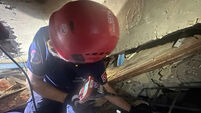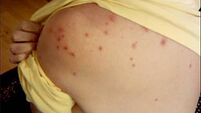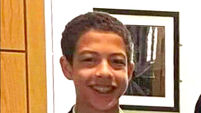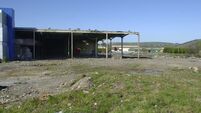'It was heartbreaking to know a potential lifeline existed': Cancer patients call for access to lifesaving drugs

Research has found Irish patients see slower access to many new therapies and treatments than patients in Europe.
A cancer patient who needed €300,000 in fundraising to have vital treatment in London has joined forces with other advocates to call for faster access to lifesaving drugs in Ireland.
The United Cancer Advocates Network (Ucan) includes people with experience of 12 cancers, or stages of cancer. The group handed in a letter at Leinster House on Wednesday for health minister Jennifer Carroll MacNeill.
James Hastings, 42, and a father of three, was diagnosed with stage 4 cholangiocarcinoma in June 2023.
“Hearing ‘Stage 4 cancer’ was devastating, and being told that palliative chemotherapy was my only option felt like a death sentence,” he said.
The medicine he needed was approved by the European Medicines Agency (EMA).
However, each country must make its own decisions about new drugs, and it had not been approved for use in Ireland.
“My oncologist even tried to secure compassionate access, but the answer was no. It was heartbreaking to know that a potential lifeline existed, but I couldn’t reach it,” he said.
In this case, his friends, family and wider community across Ireland rallied behind him, raising €300,000 for treatment in London.
“Without their generosity, I wouldn’t have been able to access the therapy that gave me hope and kept me fighting. It’s something I will never, ever forget,” he said.
Now the Ucan group is hoping to help change how these decisions are taken.
They pointed to previous research which found Irish patients see slower access to many new therapies and treatments than patients in Europe.
The group also said other countries have early access schemes. This means patients can receive treatment while negotiations on price or health technology assessments take place.
"The general public are not aware that they cannot access many lifesaving or life extending medications here," the group said.
Ucan chair Miriam Staunton was diagnosed with stage 3 melanoma in 2018. This later developed to stage 4.
“There were other treatments, EMA-approved treatments, available in Europe that I could have accessed at stage 3. But I couldn’t here,” she said.
“I had to wait until a year later, I progressed, and at that point I was able to access more treatment. It was only then I realised if I lived somewhere else in Europe, I could have had that treatment at stage 3, I could have had less toxic treatment.”
The mother of three now has no evidence of disease.
She said: “It worked out for me in the end, it’s good from that perspective but I could have had less treatment, I may never have got to stage 4.”
It became clear to her over time patients with other cancers faced the same barriers, she added. Ucan is not funded by pharmaceutical companies, she also said.







